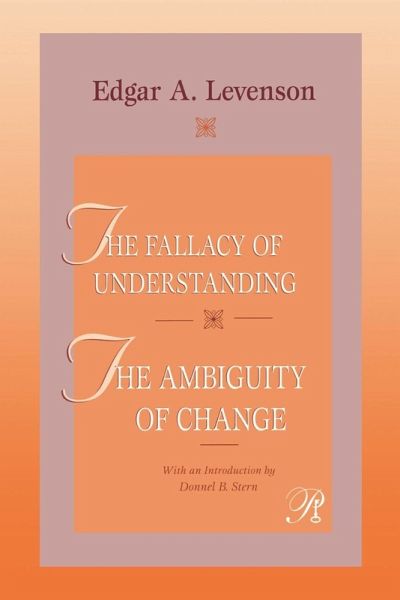
The Fallacy of Understanding & The Ambiguity of Change
Versandkostenfrei!
Versandfertig in 6-10 Tagen
63,99 €
inkl. MwSt.

PAYBACK Punkte
32 °P sammeln!
In The Fallacy of Understanding (1972) and The Ambiguity of Change (1983), Edgar Levenson elaborated the many ways in which the psychoanalyst and the patient interact - unconsciously, continuously, inevitably. For Levenson, it was impossible for the analyst not to interact with the patient, and the therapeutic power of analysis derived from the analyst's ability to step back from the interactive embroilment (and the mutual enactments to which it led) and to reflect with the patient on what each was doing to, and with, the other.Invariably, Levenson found, the analyst-analysand interaction repr...
In The Fallacy of Understanding (1972) and The Ambiguity of Change (1983), Edgar Levenson elaborated the many ways in which the psychoanalyst and the patient interact - unconsciously, continuously, inevitably. For Levenson, it was impossible for the analyst not to interact with the patient, and the therapeutic power of analysis derived from the analyst's ability to step back from the interactive embroilment (and the mutual enactments to which it led) and to reflect with the patient on what each was doing to, and with, the other.
Invariably, Levenson found, the analyst-analysand interaction reprised patterns of experience that typified the analysand's early family relationships. The reconceptualization of the analyst-analysand relationship and of the manner in which the analytic process unfolded would become foundational to contemporary interpersonal and relational approaches to psychoanalysis and psychotherapy. But Levenson's perspective was revolutionary at the time of its initial formulation in The Fallacy of Understanding and remained so at the time of its fuller elaboration in The Ambiguity of Change.
The Analytic Press is pleased to reprint within the Psychoanalysis in a New Key Book Beries two works that have proven influential in the realignment of psychoanalytic thought and practice away from Freudian drive theory and toward a contemporary appreciation of clinical process in its interactive, enactive, and participatory dimensions. Newly introduced by series editor Donnel Stern, The Fallacy of Understanding and The Ambiguity of Change are richly deserving of the designation "contemporary classics" of psychoanalysis.
Invariably, Levenson found, the analyst-analysand interaction reprised patterns of experience that typified the analysand's early family relationships. The reconceptualization of the analyst-analysand relationship and of the manner in which the analytic process unfolded would become foundational to contemporary interpersonal and relational approaches to psychoanalysis and psychotherapy. But Levenson's perspective was revolutionary at the time of its initial formulation in The Fallacy of Understanding and remained so at the time of its fuller elaboration in The Ambiguity of Change.
The Analytic Press is pleased to reprint within the Psychoanalysis in a New Key Book Beries two works that have proven influential in the realignment of psychoanalytic thought and practice away from Freudian drive theory and toward a contemporary appreciation of clinical process in its interactive, enactive, and participatory dimensions. Newly introduced by series editor Donnel Stern, The Fallacy of Understanding and The Ambiguity of Change are richly deserving of the designation "contemporary classics" of psychoanalysis.












